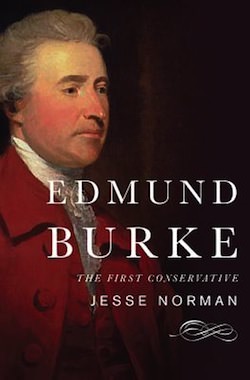The Original Conservative Reformer
Whenever conservatives are in this sort of pensive mood, they repair to the thought of the philosopher whom Jesse Norman, a Conservative member of the British Parliament, labels "The First Conservative," the subtitle of his new book on Edmund Burke.
WASHINGTON — Let’s praise a struggling conservative reform movement seeking to disentangle the right’s cause from extremism and to make its ideas more compelling to a younger and broader swath of Americans.
It’s a movement of diverse strands and competing motives. Some conservatives are looking for a much larger dose of reform than others.
The change-as-little-as-possible wing would keep the same old creed but adorn it in new, more attractive clothes. But the Serious Rethinking crowd is trying to engage problems that conservatives usually ignore — notably, rising inequality and declining social mobility. And the 14 Republican senators who helped give the immigration bill a big majority in their chamber last week sent a signal that many on the right understand the need to appeal to an increasingly diverse electorate.
For the GOP’s political consultants, the effort’s real purpose is to win future elections. But other innovators on the right worry about governing. They have grown impatient with a thin doctrine that sees lower taxes, smaller government and deregulation as the solution to every problem we confront.
Whenever conservatives are in this sort of pensive mood, they repair to the thought of the philosopher whom Jesse Norman, a Conservative member of the British Parliament, labels “The First Conservative,” the subtitle of his new book on Edmund Burke.
Norman’s Burke biography ought to be one of the hot books for the right over the next year. Like Burke (1729-1797), Norman is a philosopher as well as a politician. He offers a brisk and engaging introduction to the iconic thinker’s life and thought.
Burke’s conservatism was based on a proper understanding of that word. He believed in preserving the social order and respecting old habits. He persistently warned against the destructive character of radical change. He was wary of ideology and grand ideas, rejecting, as Norman puts it, “universal claims divorced from an actual social context.” Burke saw the well-ordered society as a “partnership of the dead, the living and the yet to be born,” a nice formula for a forward-looking traditionalism — and not a bad slogan for environmentalists.
His critics (Tom Paine was among the fiercest) saw Burke as an apologist for the privileged and an enemy of free individuals. Norman vigorously defends Burke against these charges, emphasizing his fundamental moderation and support for reform as an alternative to revolution. Burke believed not so much in small government but in what Norman labels “slow government,” rooted in modesty and humility about what politics can achieve.
But it’s to Norman’s credit that he recognizes how “Burke also clips the wings of many contemporary conservatives.” While he “helped establish modern conceptions of nationhood and national allegiance” he “rejected military adventures.” He “celebrated religious observance, but despised moral absolutism.”
Norman also sees Burke as implicitly offering “a profound critique of the market fundamentalism now prevalent in Western society.” He thinks that Burke would “note the extraordinary greed and self-dealing seen over the past decade by the modern nabobs of banking and finance in a series of cartels disguised as markets.” And a Burkean conservatism would be wary of any ideology that “causes people to lose sight of the real social sources of human well-being and to become more selfish and individualistic, by priming them with ideas of financial success and celebrity.”
As you can see, it’s no accident that American liberals tend to welcome Burke revivals on the right whenever they come along. In a 1955 essay written during an earlier burst of enthusiasm for Burke, the late Arthur Schlesinger Jr. praised Burke’s approach as “inspired by a belief in the organic character of society, where power implies responsibility and where all classes should be united in harmonious union by a sense of common trust and mutual obligation.”
The problem for conservatives now is remarkably similar to one Schlesinger identified nearly 60 years ago. Burke, after all, was defending an old landed aristocracy that grew out of “centuries of feudalism.” The United States had no feudalism, Schlesinger wrote, so “our upper classes base their position not on land or tradition or a sense of social responsibility but on the folding stuff.”
Ah, yes, money. Conservative reformers should contemplate Burke to remind themselves that their intellectual heritage is about so much more than cuts in taxes and a special concern for “job creators” with large amounts of capital. Burke expressed an affection for the “little platoon” in society. Conservatism will flounder unless it remembers the imperative of addressing the interests of the many, not the few.
E.J. Dionne’s e-mail address is ejdionne(at)washpost.com.
© 2013, Washington Post Writers Group
Your support matters…Independent journalism is under threat and overshadowed by heavily funded mainstream media.
You can help level the playing field. Become a member.
Your tax-deductible contribution keeps us digging beneath the headlines to give you thought-provoking, investigative reporting and analysis that unearths what's really happening- without compromise.
Give today to support our courageous, independent journalists.






You need to be a supporter to comment.
There are currently no responses to this article.
Be the first to respond.